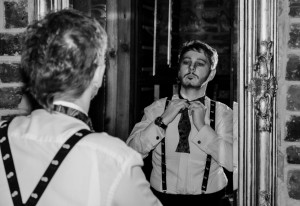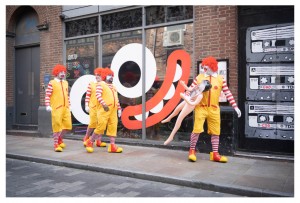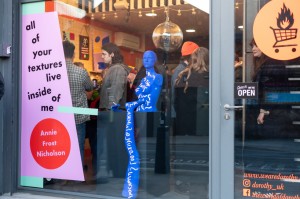A Direct Attack On Conservative Party Politics? Jennet Thomas — Reviewed
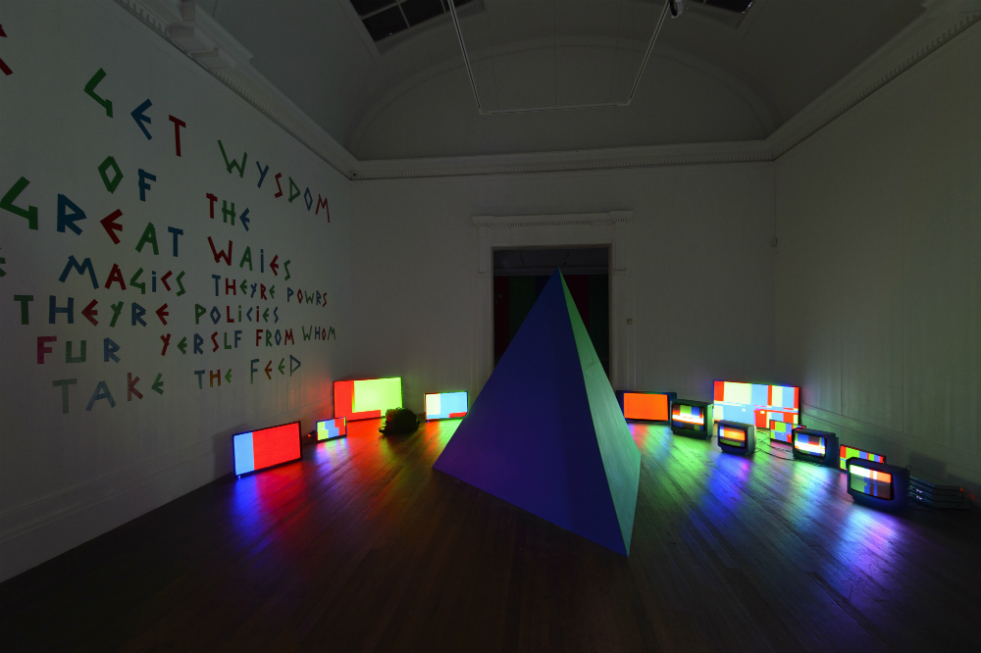
Artistic coalitions and satirical encounters: Deb Laing finds that artist Jennet Thomas cuts a fine political line at the Grundy Art Gallery, and all the better for it…
A Margaret Thatcher impersonator, acting as a Greek singular chorus, providing interludes as two central female characters and a cardboard box baby embark on a quest to find the perfect device? This is Jennet Thomas’ satirical experimental and multi-media film installation THE UNSPEAKABLE FREEDOM DEVICE, a controversial commission that has faced opposition and an eventual one-year delay by Blackpool’s local council, steering it away from last year’s General Election, under concerns that a publicly-funded gallery shouldn’t be seen to be taking political sides. However, as I found, the illusion of Thatcher is a reflective one rather than a direct attack.
British satire, from which Thomas sources her work, has traditionally adopted intelligent forms of reinterpreting some of the worst aspects of political and cultural extremities. Her art could be said to have an advantage by its ambiguity and its ability to play with meaning without institutional hang-ups.
Visually, Thomas’s installations are reminiscent of Peter Greenway‘s 1980s set designs (amongst others). The chessboard imagery and solid-colour pyramids that dominate the gallery suggesting an abstract game of geometrical and figurative forms, only to be confronted with morphological set pieces. Thomas’s film, placed high on the gallery wall, is narrated in two time zones: one being reminiscent of mediaeval England, the other being a post-industrial landscape. Thomas adopts a loose pilgrimage fable to evoke what are essentially contemporary messages without definitive answers.
Visually colour-coded red, green and blue visual motifs, communicated through RGB LED display, metaphorically provide a movable feast for the eyes and assured recognition of computer technology. Thomas’s vibrant and malleable objects float across the screen, and the act of eating — or the ‘feed’ as it’s mediated — is symbolic both of a communication device and one which can re-nourish or replenish the human condition.
Thomas’s ability to provide paradoxes comes from her use of binary oppositions, through technical irony that is both facilitating and disabling. In addition, monetary exchange between characters are constructed through the ancient use of bartering, coloured stones that change colour, transform and dissolve; giving the work a sci-fi sensibility. In contrast, the two protagonists — one of whom is called Mary, whose religious significance turns to the ‘Blu’ party in ‘Blupool’ – experience a nomadic existence, the effective juxtaposition of uninhabited rural settings and dystopian mise-en-scene, that are fitting for the philosophical extremities in the film. Both Orwellian and Beckett-like in places, the characters are watched through a device from which Thomas explores the passing of political mediocrity.
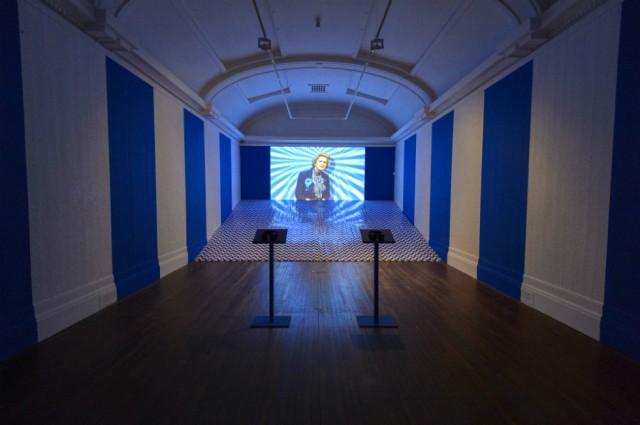
In this Grundy commission, Thomas both attacks and reinforces societal beliefs: the Iron Lady status, for example, is reinforced in the film through the use of real sound bites as a form of direct address; famously: “The Lady’s not for Turning”. Similarly, it was originally used by Soviet and then British journalists to reinforce Thatcher’s negative press. In a sharp marketing move, the name Iron Lady was later used as positive branding by Thatcher herself. And so a moniker was born.
By playing on the Thatcher myth, the blue doll caricature used as a prop and narrative ‘gift’ in the film implies a further reading; that of a magical doll possessing healing powers, that of instant gratification. These powers are latterly seen as problematic, and towards the end of the film they remind us of the political ramifications of needing to work and, suggestively, the draconian measures that a present-day government make on those that do not.
Thomas’s film is set partly in Blackpool’s famous Winter Gardens, the building that accommodated the Conservative Party Conference during the 1980s, and from which Thatcher delivered some of her most famous speeches. (Dressed in blue and white-striped headscarves, there is possibly an additional art historic reference here — to artist Daniel Buren who campaigned for art in public places in 1968 in protest against the commercial art world. With horizontal stripes on fabric, Buren’s aim originally was to block the entrance to the Apollinaire Gallery in Milan.)
The Winter Gardens scene symbolically reinvents the death of socialism: a double schism both historical and personal between the two central characters. One is ‘upgraded’; the other not. It may be suggested that Thomas’s film exposes the failings of all parties and policies that adopt a neo-liberalist ideology: one that believes in monetarism and individual ownership of material possessions as a religion. THE UNSPEAKABLE FREEDOM DEVICE in her film is the opium of the masses: the next new, desirable, must-have materialistic object being sold through persuasive discourse.
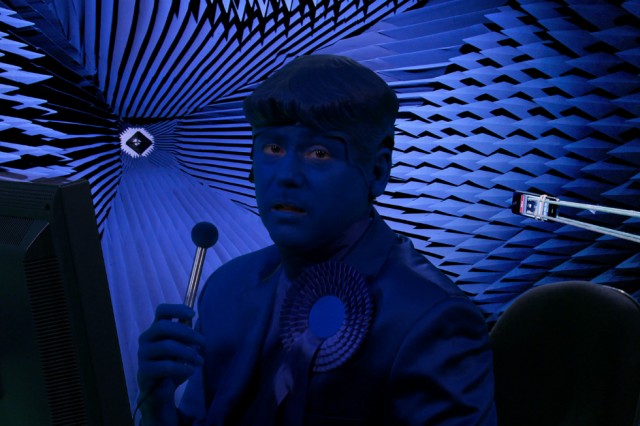
By continuing the historical trend of producing uncertainty, Thomas’s artwork signals a fractured interpretation, applying rhetorical devices that read as metaphorical jargon or advertising-speak. Written text on screen demands the two characters to TRANSLATE YOUR NATURAL ASSETS INTO CASH. The words ‘value’ and ‘hands’ being repeated throughout, the red figure awash with hands whilst the blue figure poses as a game show host or zealous preacher.
Multi-faceted messages are in abundance, so why local councillors postponed the film’s release until post-election seems bizarre. Not unlike playing a surreal game of Hunger Games, Jennet Thomas’s work has become politicised, unaware of the control local politics have on art where CONTROL hovers over the subordinate. The illusion of the Blue Lady is a reflective one rather than a direct attack on Conservative Party politics.
That being said, maybe we all need to cross the political line now that Thomas has provided a fitting allegory for those who demonise for political gain.
Deb Laing
See Jennet Thomas, THE UNSPEAKABLE FREEDOM DEVICE, until 22 August 2015 at the Grundy Gallery, Blackpool — free entry
Open Monday to Saturday 10am to 5pm and bank holidays 11-4pm. Closed Sundays
See more from the artist’s website



